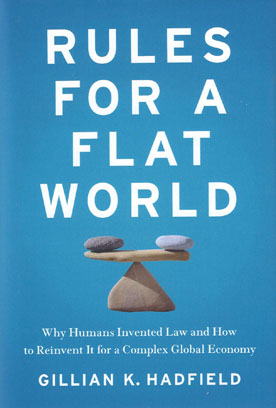
In this colorful and consistently engaging work, law and economics professor Gillian Hadfield picks up where New York Times columnist Thomas Friedman left off in his influential 2005 book, The World is Flat.
Friedman was focused on the infrastructure of communications and technology-the new web-based platform that allows business to follow the hunt for lower costs, higher value and greater efficiency around the planet seemingly oblivious to the boundaries of nation states. Hadfield peels back this technological platform to look at the 'structure that lies beneath'—our legal infrastructure, the platform of rules about who can do what, when and how.
Often taken for granted, economic growth throughout human history has depended at least as much on the evolution of new systems of rules to support ever-more complex modes of cooperation and trade as it has on technological innovation.
When Google rolled out YouTube in over one hundred countries around the globe simultaneously, for example, it faced not only the challenges of technology but also the staggering problem of how to build success in the context of a bewildering and often conflicting patchwork of nation-state-based laws and legal systems affecting every aspect of the business-contract, copyright, encryption, censorship, advertising and more.
Google is not alone. A study presented at the World Economic Forum in Davos in 2011 found that for global firms, the number one challenge of the modern economy is increasing complexity, and the number one source of complexity is law. Today, even our startups, the engines of economic growth, are global from Day One.
Combining an impressive grasp of the empirical details of economic globalization with an ambitious re-envisioning of our global legal system, Rules for a Flat World promises to be a crucial and influential intervention into the debates surrounding how best to manage the evolving global economy.